以ing和ed结尾的形容词练习测试
最新以-ing和-ed结尾的形容词练习
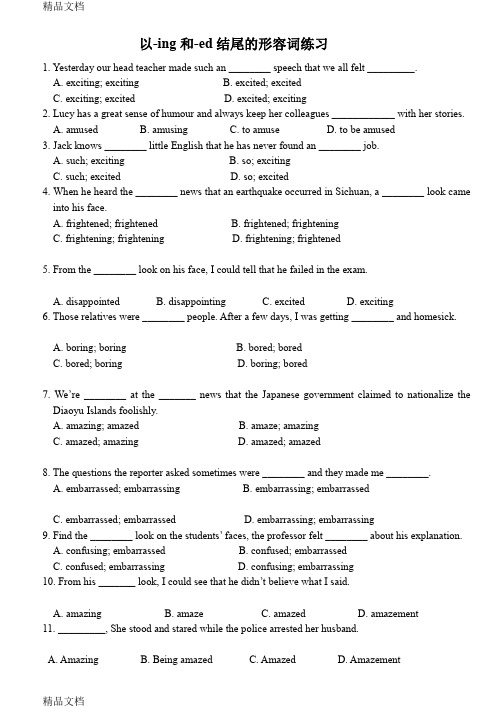
以-ing和-ed结尾的形容词练习1. Yesterday our head teacher made such an ________ speech that we all felt _________.A. exciting; excitingB. excited; excitedC. exciting; excitedD. excited; exciting2. Lucy has a great sense of humour and always keep her colleagues ____________ with her stories.A. amusedB. amusingC. to amuseD. to be amused3. Jack knows ________ little English that he has never found an ________ job.A. such; excitingB. so; excitingC. such; excitedD. so; excited4. When he heard the ________ news that an earthquake occurred in Sichuan, a ________ look came into his face.A. frightened; frightenedB. frightened; frighteningC. frightening; frighteningD. frightening; frightened5. From the ________ look on his face, I could tell that he failed in the exam.A. disappointedB. disappointingC. excitedD. exciting6. Those relatives were ________ people. After a few days, I was getting ________ and homesick.A. boring; boringB. bored; boredC. bored; boringD. boring; bored7. We’re ________ at the _______ news that the Japanese government claimed to nationalize the Diaoyu Islands foolishly.A. amazing; amazedB. amaze; amazingC. amazed; amazingD. amazed; amazed8. The questions the reporter asked sometimes were ________ and they made me ________.A. embarrassed; embarrassingB. embarrassing; embarrassedC. embarrassed; embarrassedD. embarrassing; embarrassing9. Find the ________ look on the students’ faces, the professor felt ________ about his explanation.A. confusing; embarrassedB. confused; embarrassedC. confused; embarrassingD. confusing; embarrassing10. From his _______ look, I could see that he didn’t believe what I said.A. amazingB. amazeC. amazedD. amazement11. _________, She stood and stared while the police arrested her husband.A. AmazingB. Being amazedC. AmazedD. Amazement12. From their ________ looks we can see that they were _________ by the question. (puzzle)13. It’s ___________ to do the difficult task. (embarrass)14. I am ___________ at the news. (amaze)15. Tom told us a lot of _____________ stories. (amaze)CABDA DCBBC C12puzzled; puzzled 13embarrassing 14 amazed 15 amazing。
高中英语语法--ing与ed结尾的形容词练习
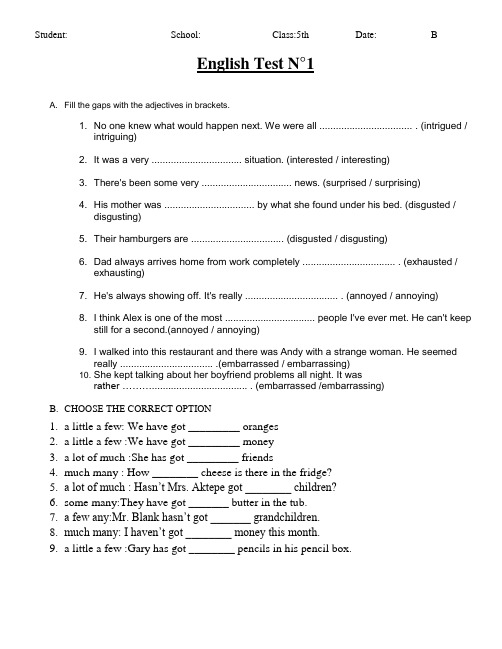
Student: ____________________ School:_____________ Class:5th_________ Date: _________ BEnglish Test N°1A. Fill the gaps with the adjectives in brackets.1. No one knew what would happen next. We were all .................................. . (intrigued /intriguing)2. It was a very ................................. situation. (interested / interesting)3. There's been some very ................................. news. (surprised / surprising)4. His mother was ................................. by what she found under his bed. (disgusted /disgusting)5. Their hamburgers are .................................. (disgusted / disgusting)6. Dad always arrives home from work completely .................................. . (exhausted /exhausting)7. He's always showing off. It's really .................................. . (annoyed / annoying)8. I think Alex is one of the most ................................. people I've ever met. He can't keepstill for a second.(annoyed / annoying)9. I walked into this restaurant and there was Andy with a strange woman. He seemedreally .................................. .(embarrassed / embarrassing)10. She kept talking about her boyfriend problems all night. It wasrather ………................................... . (embarrassed /embarrassing)B.CHOOSE THE CORRECT OPTION1.a little a few: We have got _________ oranges2.a little a few :We have got _________ money3.a lot of much :She has got _________ friends4.much many : How ________ cheese is there in the fridge?5.a lot of much : Hasn’t Mrs. Aktepe got ________ children?6.some many:They have got _______ butter in the tub.7.a few any:Mr. Blank hasn’t got _______ grandchildren.8.much many: I haven’t got ________ money this month.9.a little a few :Gary has got ________ pencils in his pencil box.。
以ing及ed结尾的形容词练习.docx
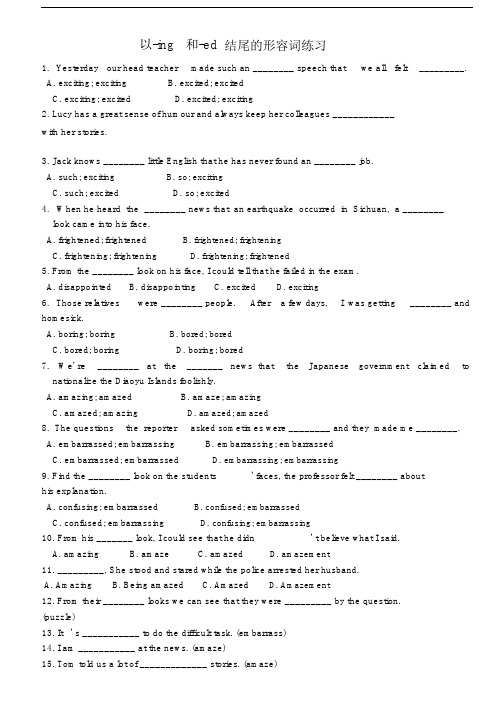
以-ing和-ed结尾的形容词练习1. Yesterday our head teacher made such an ________ speech that we all felt_________.A. exciting; excitingB. excited; excitedC. exciting; excitedD. excited; exciting2.Lucy has a great sense of humour and always keep her colleagues ____________with her stories.3. Jack knows ________ little English that he has never found an ________ job.A. such; excitingB. so; excitingC. such; excitedD. so; excited4.When he heard the ________ news that an earthquake occurred in Sichuan, a ________look came into his face.A. frightened; frightenedB. frightened; frighteningC. frightening; frighteningD. frightening; frightened5. From the ________ look on his face, I could tell that he failed in the exam.A. disappointedB. disappointingC. excitedD. exciting6. Those relatives were ________ people. After a few days, I was getting ________ and homesick.A. boring; boringB. bored; boredC. bored; boringD. boring; bored7. We’ re ________ at the _______ news that the Japanese government claimed tonationalize the Diaoyu Islands foolishly.A. amazing; amazedB. amaze; amazingC. amazed; amazingD. amazed; amazed8. The questions the reporter asked sometimes were ________ and they made me ________.A. embarrassed; embarrassingB. embarrassing; embarrassedC. embarrassed; embarrassedD. embarrassing; embarrassing9. Find the ________ look on the students’ faces, the professor felt ________ abouthis explanation.A. confusing; embarrassedB. confused; embarrassedC. confused; embarrassingD. confusing; embarrassing10. From his _______ look, I could see that he didn’ t believe what I said.A. amazingB. amazeC. amazedD. amazement11. _________, She stood and stared while the police arrested her husband.A. AmazingB. Being amazedC. AmazedD. Amazement12.From their ________ looks we can see that they were _________ by the question.(puzzle)13.It ’ s ___________ to do the difficult task. (embarrass)14.I am ___________ at the news. (amaze)15.Tom told us a lot of _____________ stories. (amaze)CABDA DCBBC C12puzzled; puzzled13embarrassing14 amazed 15 amazing。
-ed形容词和-ing形容词辨析和测验
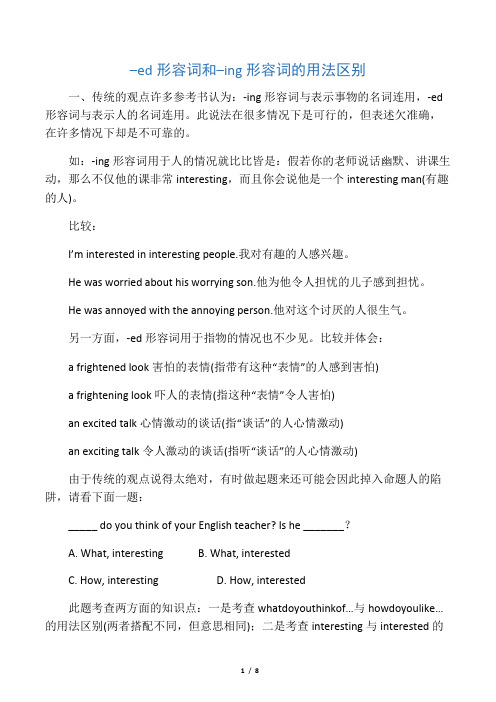
–ed形容词和–ing形容词的用法区别一、传统的观点许多参考书认为:-ing形容词与表示事物的名词连用,-ed 形容词与表示人的名词连用。
此说法在很多情况下是可行的,但表述欠准确,在许多情况下却是不可靠的。
如:-ing形容词用于人的情况就比比皆是:假若你的老师说话幽默、讲课生动,那么不仅他的课非常interesting,而且你会说他是一个interesting man(有趣的人)。
比较:I’m interested in interesting people.我对有趣的人感兴趣。
He was worried about his worrying son.他为他令人担忧的儿子感到担忧。
He was annoyed with the annoying person.他对这个讨厌的人很生气。
另一方面,-ed形容词用于指物的情况也不少见。
比较并体会:a frightened look害怕的表情(指带有这种“表情”的人感到害怕)a frightening look吓人的表情(指这种“表情”令人害怕)an excited talk心情激动的谈话(指“谈话”的人心情激动)an exciting talk令人激动的谈话(指听“谈话”的人心情激动)由于传统的观点说得太绝对,有时做起题来还可能会因此掉入命题人的陷阱,请看下面一题:_____ do you think of your English teacher? Is he _______?A. What, interestingB. What, interestedC. How, interestingD. How, interested此题考查两方面的知识点:一是考查whatdoyouthinkof…与howdoyoulike…的用法区别(两者搭配不同,但意思相同);二是考查interesting与interested的用法区别。
若套用以上关于-ing形容词与-ed形容词的区别,则可能将答案锁定为D。
高中英语一轮复习---以-ed和-ing结尾的形容词和练习题大全(带答案)
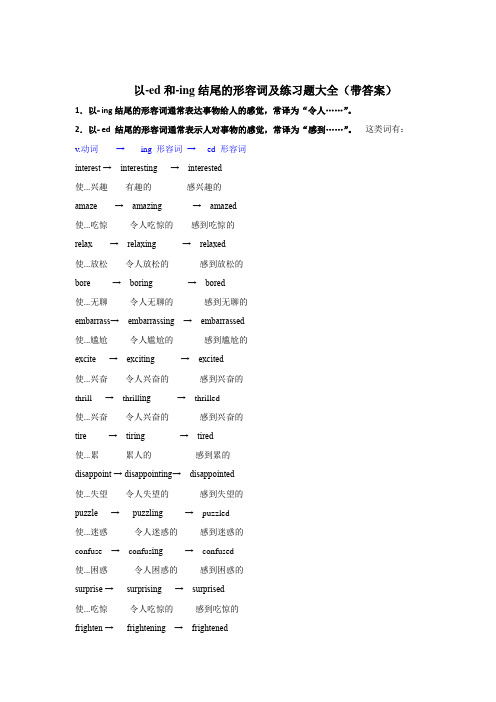
以-ed和-ing结尾的形容词及练习题大全(带答案)1.以ing结尾的形容词通常表达事物给人的感觉,常译为“令人……”。
2.以ed 结尾的形容词通常表示人对事物的感觉,常译为“感到……”。
这类词有:v.动词→ -ing 形容词→ -ed 形容词interest → interesting → interested使...兴趣有趣的感兴趣的amaze → amazing → amazed使...吃惊令人吃惊的感到吃惊的relax → relaxing → relaxed使...放松令人放松的感到放松的bore → boring → bored使...无聊令人无聊的感到无聊的embarrass→ embarrassing → embarrassed使...尴尬令人尴尬的感到尴尬的excite → exciting → excited使...兴奋令人兴奋的感到兴奋的thrill → thrill ing → thrilled使...兴奋令人兴奋的感到兴奋的tire → tiring → tired使...累累人的感到累的disappoint → disappointing→ disappointed使...失望令人失望的感到失望的puzzle → puzzling → puzzled使...迷惑令人迷惑的感到迷惑的confuse → confus ing → confused使...困惑令人困惑的感到困惑的surprise → surprising → surprised使...吃惊令人吃惊的感到吃惊的frighten → frightening → frightened使...害怕令人害怕的感到害怕的terrify → terrifying → terrified恐吓/吓唬令人恐惧的感到恐惧的satisfy → satisfying → satisfied使...满意令人满意的感到满意的please → pleas ing → pleased使...高兴令人愉快的感到高兴的/满意的amus e → am us ing → am used使...欢乐逗人笑的感到逗乐的astonish → astonishing → astonished使...惊讶令人惊讶的感到惊讶的shock→ shocking → shocked使...震惊令人震惊的感到震惊的annoy → annoying → annoyed使...烦恼令人烦的感到恼怒的move → moving → moved移动令人感动的感动的disappoint→ disappointing → disappointed使...失望令人失望的感到失望的threaten→ threatening → threatened恐吓/威胁胁迫的收到威胁的worry→worrying → worried使...担心令人担心的感到担心的练习题一,用所给词的适当形式填空1.This is an book, and I’m in it. (interest)2.Seeing the result, we are all .(disappoint).3.The (surprise) loo k on his face suggested that he hadn’t expected that.4.这匹受到惊吓的马开始跑起来。
ing形容词和ed形容词经典练习

一用括号内所给动词的-ed形式或-ing形式填空1. The children were after the trip. (tire)2. The trip was . (tire)3. The children went to bed early after the trip. (tire)4. The trip lasted a whole day. (tire)5. The trip made the children . (tire)6. The bad weather made the trip . (tire)7. Tom’s parents are ____ at his ____ results of the exams.(disappoint)8. and angry, he left the meeting-room. (disappoint)9. It is that he didn’t pass the examination.(disappoint)10. When hearing thenews that Michael Jackson passed away, they wereto look at each other. (surprise)11. He was about his son. (worry)二、选择题( )1. The little boy is not getting on well in maths and worse still, he is even unwilling to go to school. With her son _____, she feels very ______.A. disappointing; worryingB. disappointing; worriedC. disappointed; worriedD. disappointed; worrying( )2. After the Anti-terrorist War, the American soldiers returned h ome, ______.A. safe but tiredB. safely but tiredC. safe and tiringD. saf ely and tiring( )3. As we all know, typing is a ______ job to a ______ heart.A. tired; tiredB. tired; tiringC. tiring; tiredD. tiring; tiring ( )4. _____ do you think of your English teacher? Is he _______?A. What, interestingB. What, interestedC. How, interestingD. How, interested。
以-ing和-ed结尾的形容词搭配练习

以-ing和-ed结尾的形容词搭配练习本文档旨在提供关于以-ing和-ed结尾的形容词搭配的练。
以下是一些常见的例子和联系问题。
-ing形容词的用法1. 请填写下列句子中空格处需要使用以-ing结尾的形容词。
- The movie was __________ (boring) and I ___ it.- She looked __________ (stunning) in her new dress.- The children were __________ (exciting) to go to the amusement park.2. 请将以下名词转换为以-ing结尾的形容词并填入空格中。
- danger: __________- interest: __________- amuse: __________- relax: __________-ed形容词的用法1. 请填写下列句子中空格处需要使用以-ed结尾的形容词。
- The news was __________ (unexpected) ___ surprise.- The meal was __________ (us) and I ___.- After the long hike, I felt __________ (exhausted) but satisfied.2. 请将以下名词转换为以-ed结尾的形容词并填入空格中。
- amaze: __________- inspire: __________- interest: __________- disappoint: __________总结本文档提供了以-ing和-ed结尾的形容词的练习。
通过填写空格,并结合相应的名词转换,您可以巩固对这些形容词的理解和正确用法。
希望这些练习对您的英语学习有所帮助!。
以-ing和-ed结尾的形容词词义辨析练习
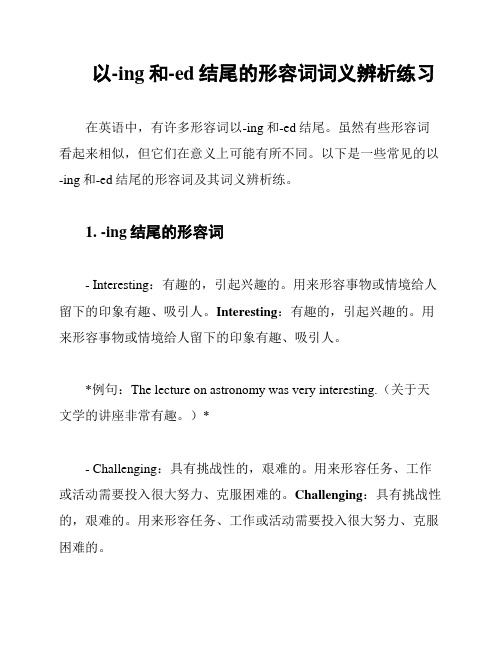
以-ing和-ed结尾的形容词词义辨析练习在英语中,有许多形容词以-ing和-ed结尾。
虽然有些形容词看起来相似,但它们在意义上可能有所不同。
以下是一些常见的以-ing和-ed结尾的形容词及其词义辨析练。
1. -ing结尾的形容词- Interesting:有趣的,引起兴趣的。
用来形容事物或情境给人留下的印象有趣、吸引人。
Interesting:有趣的,引起兴趣的。
用来形容事物或情境给人留下的印象有趣、吸引人。
*例句:The lecture on astronomy was very interesting.(关于天文学的讲座非常有趣。
)*- Challenging:具有挑战性的,艰难的。
用来形容任务、工作或活动需要投入很大努力、克服困难的。
Challenging:具有挑战性的,艰难的。
用来形容任务、工作或活动需要投入很大努力、克服困难的。
*例句:Running a marathon is a challenging experience.(参加马拉松是一次具有挑战性的经历。
)*- Exciting:令人兴奋的,激动人心的。
用来形容引起强烈兴奋、激动的事物或情景。
Exciting:令人兴奋的,激动人心的。
用来形容引起强烈兴奋、激动的事物或情景。
*例句:The roller coaster ride was very exciting.(坐过山车很令人兴奋。
)*2. -ed结尾的形容词- Bored:感到厌烦的,无聊的。
用来形容因缺乏刺激、无聊而感到厌烦的状态。
Bored:感到厌烦的,无聊的。
用来形容因缺乏刺激、无聊而感到厌烦的状态。
*例句:She felt bored during the long lecture.(她在长时间的讲座中感到很无聊。
)*- Pleased:感到高兴的,满意的。
用来形容因某种原因而感到高兴、满意的情绪。
Pleased:感到高兴的,满意的。
用来形容因某种原因而感到高兴、满意的情绪。
根据ing形容词和ed形容词经典练习

根据ing形容词和ed形容词经典练习根据-ing形容词和-ed形容词经典练这份文档旨在提供一些经典的练,帮助读者更好地理解和运用-ing形容词和-ed形容词。
下面是一些例子和解析,供您参考。
-ing形容词- "interesting" 表示引起兴趣的,如 "an interesting book" (一本有趣的书)。
- "boring" 表示令人无聊的,如 "a boring movie" (一部无聊的电影)。
- "exciting" 表示令人兴奋的,如 "an exciting adventure" (一次激动人心的冒险)。
-ed形容词- "interested" 表示感兴趣的状态,如 "I am interested in learning English" (我对研究英语感兴趣)。
- "bored" 表示感到无聊的状态,如 "He looked bored during the lecture" (他在讲座期间看起来很无聊)。
练题请根据下面的句子选择适当的形容词填空。
1. The movie was __________. (exciting / excited)2. He seemed __________ during the meeting. (interested / interesting)3. I felt __________ after finishing the marathon. (tired / tiring)4. The book was __________. (bored / boring)答案解析1. The movie was exciting. 此处需要用-ing形容词来修饰名词"movie",表示电影本身很令人兴奋。
ing ed形容词练习题

ing ed形容词练习题Ing-ed形容词练习题在英语中,形容词是用来描述名词的词语。
其中,ing-ed形容词是一种常见的形容词形式。
它们可以用来描述人、事物或情况,并且可以给句子增添更多的细节和描述。
下面是一些关于ing-ed形容词的练习题,让我们一起来挑战一下吧!1. 这个电影很有趣,我觉得它很________。
答案:interesting2. 她对这个问题很________,因为她在这个领域有很多经验。
答案:experienced3. 我们在海滩上度过了一个________的夏天。
答案:relaxing4. 这个问题对他来说很________,因为他没有相关的知识。
答案:confusing5. 她的演讲非常________,每个人都被她的话所打动。
答案:inspiring6. 这个城市的夜景非常________,每个角落都散发着独特的魅力。
答案:captivating7. 这个故事很________,我被它的情节所吸引。
答案:intriguing8. 这个孩子非常________,他总是充满了活力和好奇心。
答案:energetic9. 那个音乐会给人一种________的感觉,每个人都被音乐所深深吸引。
答案:enchanting10. 这个问题很________,我们需要更多的信息来解决它。
答案:complicated11. 这个地方的美景令人________,每个人都被它的壮丽所震撼。
答案:amazed12. 这个项目的进展很________,我们已经取得了很大的成就。
答案:exciting13. 这个任务对他来说很________,因为他没有足够的时间来完成它。
答案:challenging14. 这个小镇的氛围很________,每个人都感到宁静和放松。
答案:peaceful15. 这个问题很________,我们需要更多的人来帮助解决它。
答案:daunting通过这些练习题,我们可以更好地理解和运用ing-ed形容词。
英语形容词ed和ing结尾

1. 通过下面的例子来看看以-ed和-ing结尾的形容词•I was really bored in that presentation.•That was a really boring presentation.2. 语法测试一1) You look really ______. Why don’t you go to bed?A. tiredB. tiring2) Can I call you? I’ve got some very ______ news for you!A. excitedB. exciting3) My neighbor is always playing loud music. It’s very ______.A. annoyedB. annoying4) The directions were ______ and we got lost.A. confusedB. confusing5) I was really ______ that I won the competition.A. surprisedB. surprising6) She didn’t call about the car. I don’t think she’s ______ in buying it.A. interestedB. interesting7) My cats get really ______ when there’s a thunderstorm.A. frightenedB. frightening8) His exam results were really ______.A. disappointedB. disappointing3. 语法释义•-ed结尾的形容词:通常描述情绪– 告知人们的感受如何。
e.g.:1) I was so bored in that lesson, and I almost fell asleep.2) He was surprised to see Helen after all those years.3) She was really tired and went to bed early.•-ing结尾的形容词:通常描述某物引起的情绪– 枯燥的课程让人感觉枯燥。
根据ing形容词和ed形容词经典练习
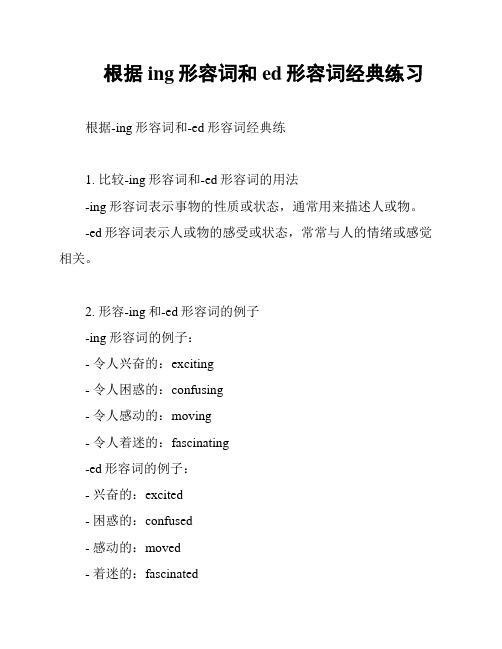
根据ing形容词和ed形容词经典练习根据-ing形容词和-ed形容词经典练1. 比较-ing形容词和-ed形容词的用法-ing形容词表示事物的性质或状态,通常用来描述人或物。
-ed形容词表示人或物的感受或状态,常常与人的情绪或感觉相关。
2. 形容-ing和-ed形容词的例子-ing形容词的例子:- 令人兴奋的:exciting- 令人困惑的:confusing- 令人感动的:moving- 令人着迷的:fascinating-ed形容词的例子:- 兴奋的:excited- 困惑的:confused- 感动的:moved- 着迷的:fascinated3. 区分-ing和-ed形容词的用法-ing形容词描述事物的性质或状态,而不是人或物的感受。
例如,“The movie was exciting.”(电影很刺激。
)表示电影本身很刺激,而不是人的感受。
-ed形容词描述人或物的感受或状态。
例如,“I was excited when I watched the movie.”(我看电影时感到兴奋。
)表示人对电影感到兴奋。
4. 练题请根据句子的语境选择合适的形容词,填入横线上:1. The book was __________.(interest/interested)2. I was __________ by the live concert.(amaze/amazed)3. The task seemed __________ at first.(confuse/confused)4. The movie was __________ and left me in tears.(move/moved)答案:1. interested2. amazed3. confusing4. moving总结:通过-ing形容词和-ed形容词的练习,我们可以更好地理解它们之间的区别和用法。
使用正确的形容词来描绘事物的性质和人的感受,能够让我们的语言更加准确生动。
以-ing和-ed结尾的形容词用法练习

以-ing和-ed结尾的形容词用法练习.txt以-ing和-ed结尾的形容词用法练以-ing和-ed结尾的形容词是英语中常见的形容词形式。
它们在句子中可以用来描述人、事物或情况的状态或特征。
以下是一些关于以-ing和-ed结尾的形容词用法的练。
1.选择合适的形容词填空:a) The movie was __________。
(boring / bored)b) He was __________ ___)c) ___ __________ today。
(amazing / amazed)2.填空的形容词:a) The __________ ___)b) I am __________ of his achievements。
(impress)c) The __________ ___(excite)3.用适当的形容词来描述下列图片:a)。
[Image 1](image1.jpg) - The scenery is __________。
(breathe)b)。
[Image 2](image2.jpg) - The cake looks __________。
(us)c)。
[Image 3](image3.jpg) - The students are __________。
(bored)4.阅读以下句子,判断下列形容词是以-ing还是-ed结尾:a) She is a __________ singer。
(amazing)b) The book was __________。
(excite)c) They are __________ the new car。
(fascinate)答案:1.a) boring。
b) interested。
c) amazing2.a) exhausted。
b) impressed。
c) excited3.a) breathtaking。
b) us。
c) bored4.a) -ing。
以-ing和-ed结尾的形容词练习

interesting 令 人感兴趣的
boring 令人厌 烦的
fri”
通常用于描述事物或人的性质或状态,表示“令人觉得…的” 通常用于描述事物或人的性质或状态,表示“令人觉得…的” 通常用于描述事物或人的性质或状态,表示“令人觉得…的” 通常用于描述事物或人的性质或状态,表示“令人觉得…的”
感到兴奋的:形容 某人对某事感到非 常高兴和激动
感到沮丧的:形容 某人对某事感到非 常失望和无助
感到自豪的:形容 某人对某事感到非 常骄傲和自信
表示“觉得…的”
通常用于描述人的感受和情绪 通常以-ed结尾,如“surprised”、“interested”、“frightened”等 可以修饰名词或用于句子的主语和表语 表示主观感受,强调个人或主体的情感反应
表示“令人看起来…的”
令人看起来愉快的ing形容词:delighting 令人看起来兴奋的ing形容词:thrilling 令人看起来有趣的ing形容词:amusing 令人看起来疲倦的ing形容词:tiring
以-ed结尾的形容词
表示“感到…的”
感到惊讶的:形容 某人对某事感到非 常意外和吃惊
表示“看起来…的”
以-ed结尾的形容 词通常用来描述人 的感受和情绪,例 如:surprised (惊讶的)、 interested(感 兴趣的)、 frightened(害 怕的)。
这些形容词通常 与look、seem 等动词连用,例 如:He looks surprised.(他 看起来很惊讶。)
需要注意的是, 有些以-ed结尾的 形容词也可以用 作描述事物状态 的形容词,例如: tired(疲惫的)、 glad(高兴的)。
还有一些以-ed结 尾的形容词可以 表示人的性格特 征或行为方式, 例如:polite (有礼貌的)、 brave(勇敢 的)。
高中英语一轮复习---以-ed和-ing结尾的形容词和练习题大全(带答案)

以-ed和-ing结尾的形容词及练习题大全(带答案)1.以ing结尾的形容词通常表达事物给人的感觉,常译为“令人……”。
2.以ed 结尾的形容词通常表示人对事物的感觉,常译为“感到……”。
这类词有:v.动词→ -ing 形容词→ -ed 形容词interest → interesting → interested使...兴趣有趣的感兴趣的amaze → amazing → amazed使...吃惊令人吃惊的感到吃惊的relax → relaxing → relaxed使...放松令人放松的感到放松的bore → boring → bored使...无聊令人无聊的感到无聊的embarrass→ embarrassing → embarrassed使...尴尬令人尴尬的感到尴尬的excite → exciting → excited使...兴奋令人兴奋的感到兴奋的thrill → thrill ing → thrilled使...兴奋令人兴奋的感到兴奋的tire → tiring → tired使...累累人的感到累的disappoint → disappointing→ disappointed使...失望令人失望的感到失望的puzzle → puzzling → puzzled使...迷惑令人迷惑的感到迷惑的confuse → confus ing → confused使...困惑令人困惑的感到困惑的surprise → surprising → surprised使...吃惊令人吃惊的感到吃惊的frighten → frightening → frightened使...害怕令人害怕的感到害怕的terrify → terrifying → terrified恐吓/吓唬令人恐惧的感到恐惧的satisfy → satisfying → satisfied使...满意令人满意的感到满意的please → pleas ing → pleased使...高兴令人愉快的感到高兴的/满意的amus e → am us ing → am used使...欢乐逗人笑的感到逗乐的astonish → astonishing → astonished使...惊讶令人惊讶的感到惊讶的shock→ shocking → shocked使...震惊令人震惊的感到震惊的annoy → annoying → annoyed使...烦恼令人烦的感到恼怒的move → moving → moved移动令人感动的感动的disappoint→ disappointing → disappointed使...失望令人失望的感到失望的threaten→ threatening → threatened恐吓/威胁胁迫的收到威胁的worry→worrying → worried使...担心令人担心的感到担心的练习题一,用所给词的适当形式填空1.This is an book, and I’m in it. (interest)2.Seeing the result, we are all .(disappoint).3.The (surprise) loo k on his face suggested that he hadn’t expected that.4.这匹受到惊吓的马开始跑起来。
以-ing和-ed结尾的形容词语法规则练习

以-ing和-ed结尾的形容词语法规则练习当我们研究英语形容词时,经常会遇到以-ing和-ed结尾的形容词。
这种形容词通常用来描述人、事物或感受。
在研究和运用这些形容词时,我们需要了解它们的语法规则和用法。
本文将为您介绍以-ing和-ed结尾的形容词的语法规则,并提供一些练题供您巩固所学。
以-ing结尾的形容词以-ing结尾的形容词通常描述人或事物的特征、性质或状态。
它们可以用来表示一个正在进行的动作或现在的状态。
以下是一些常见的以-ing结尾的形容词:- 令人兴奋的(exciting)- 有趣的(interesting)- 令人惊讶的(surprising)- 令人愉快的(pleasing)- 令人困惑的(confusing)练题1:从下列选择中选出适当的以-ing结尾的形容词填空。
1. The movie was _________. I couldn't stop laughing.(funny / fun)2. He is a _________ person. He always has interesting stories to share.(bored / boring)3. The news was _________. It was unexpected.(surprised / surprising)以-ed结尾的形容词以-ed结尾的形容词通常用来描述人的感受或事物的特点。
它们可以表示过去或现在的状态,或者用来描述已经完成或已经发生的事情。
以下是一些常见的以-ed结尾的形容词:- 高兴的(happy)- 惊讶的(surprised)- 害怕的(scared)- 满意的(satisfied)- 受欢迎的(popular)练题2:从下列选择中选出适当的以-ed结尾的形容词填空。
1. She was _________ when she received the gift.(excited / exciting)2. The children were _________ by the magician's tricks.(amusing / amused)3. The food at the restaurant was _________. We enjoyed every bite.(delicious / delighting)通过这些练题,您可以巩固以-ing和-ed结尾的形容词的语法规则和用法。
ed ing 形容词练习题

ed ing 形容词练习题ed ing 形容词练习题在英语学习中,形容词是我们经常使用的一种词类。
它们可以用来描述人、事物的特征和状态。
其中,以-ed 和 -ing 结尾的形容词是我们常见的两种形容词形式。
接下来,我们将通过一些练习题来加深对这两种形容词的理解。
一、选择题1. The movie was _______. It made me feel sad.a) bored b) boring c) excited d) exciting2. She was _______ when she saw the beautiful sunset.a) amazed b) amazing c) interested d) interesting3. The book is _______. I couldn't put it down.a) bored b) boring c) excited d) exciting4. He is _______ about his upcoming trip to Europe.a) amazed b) amazing c) interested d) interesting5. The lecture was _______. I fell asleep halfway through.a) bored b) boring c) excited d) exciting二、填空题1. The _______ game kept the children entertained for hours.2. I'm _______ in learning about different cultures.3. The _______ movie made me cry.4. She was _______ by the beautiful scenery.5. The _______ book was hard to put down.三、改错题1. I am very exciting to go on vacation next week.2. The movie was very bored. I fell asleep halfway through.3. The book was so interested that I couldn't stop reading it.4. The roller coaster was amazing! I felt so scare.5. The documentary was boring, but the discussion afterwards was interested.四、解释题请用自己的话解释以下句子中-ed 和 -ing 形容词的区别。
